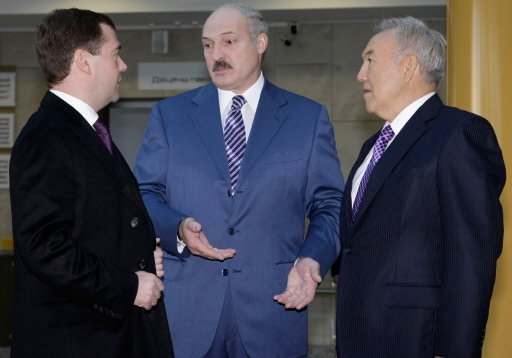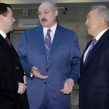
Customs Union with Russia and Belarus Raises Doubts in Kazakhstan
Publication: Eurasia Daily Monitor Volume: 6 Issue: 224
By:

Fielding questions from viewers on state-controlled television channels on November 13 Kazakhstan’s President Nursultan Nazarbayev announced that on November 27 the leaders of Russia, Belarus and Kazakhstan would gather in Minsk to sign final agreements on a Customs Union. On November 17, at a cabinet meeting, Prime Minister Karim Masimov, apparently intending to persuade the public, enumerated the economic advantages of the customs union for Kazakhstan, the expected increase in the trade volume, improvement of the investment climate within the customs union, free movement of labor, capital and goods in the common customs space and better access to outside markets for domestic producers. In fact, he added nothing new to what was reiterated on various occasions by Nazarbayev, the architect of the customs union within the Eurasian Economic Community (EurAsEc), and dismissed fears that the unsettled tariff issues on the export of oil and gas products might cause future problems (Khabar TV, November 17).
Earlier, Masimov questioned the acceptability of legal aspects of the customs union for Kazakhstan and addressed the Constitutional Council asking whether future customs regulations would not conflict with Article 4 of the constitution. The chairman of the Constitutional Council Igor Rogov responded that customs regulations to be applied by the three members of the customs union would not contradict Kazakhstan’s laws, and if necessary amendments could be introduced to the constitution, noting that any new rules and regulations to be adopted within the customs union will take precedence over national laws. However, government members are divided over this issue. Many believe that the customs union will damage Kazakhstan’s national interest and threaten its independent economic policy, potentially risking an uncontrolled inflow of foreign goods and inflation (Central Asian Monitor, November 13).
This case illustrates that Kazakhstan still faces hurdles as the deadline on adopting a unified tariff policy by the members of the customs union draws near (January 1, 2010). Preliminary agreements on the creation of a customs union between Russia and Belarus were signed as far back as 1995. Kazakhstan and Kyrgyzstan, followed by Tajikistan, joined the agreement in 1996. But Nazarbayev’s efforts to integrate EurAsEc states on the basis of a common customs system did not find much support from his counterparts, who were deeply divided over economic and political issues. Consequently, the stated aim of setting unified tariff regulations and lifting tariff restrictions for customs union member countries remained only on paper. The issue was sporadically discussed at top level talks within the framework of EurAsEc since then. In Moscow in June this year, at the trilateral heads of government meeting, the decision to create a customs union and synchronize their policies regarding the entrance into the World Trade Organization (WTO) was clearly articulated. Within the framework of the session of the interstate Council of EurAsEc, Masimov signed agreements related to forming the customs union.
The Secretary of the Customs Union Sergey Glazyev told the Belarusian media that from June 1 next year all customs control procedures in Belarus would be shifted from national boundaries to common customs union borders. The same regulations will be introduced in Kazakhstan on June 1, 2011. According to Glazyev, all agreements reached between Belarus, Kazakhstan and Russia comply with WTO standards. “We intend to eliminate all barriers that hamper free trade” Glazyev explained (Kazakhstan Today, November 13).
The optimistic mood in Moscow and Minsk contrasts with widespread skepticism in Astana. Most economic observers think that since Russia possesses huge material and natural resources, overwhelming political influence in the region and well-developed industry, it will clearly benefit from common tariff policy. Nonetheless, domestic producers in Kazakhstan will lose any competition against relatively high quality and cheap Russian and Belarus commodities. Currently, Russian industry produces competitive goods for domestic consumers and applies considerably high import duties which generate high budget revenues. The situation is different in Kazakhstan, since it is dependent on the imports of Russian and Chinese industrial goods. Lifting trade restrictions and having an underdeveloped domestic industry, the lack of competitive goods as well as the elimination of customs restrictions and unification of tariff policies is likely to spur inflation and lead to huge losses for domestic producers. Kazakhstan will no longer be able to control the export of its limited resources of coal, nonferrous metals and timber (www.diapason.kz).
Kazakhstan’s precipitate decision to form a customs union and a trade bloc with Russia and Belarus seems prompted by political motivations rather than economic reasons. It also illustrates the increasing pressure on Astana from Moscow, which strives to maintain its political and economic control over the region. Under constant pressure from its influential neighbor, Kazakhstan in recent years has shown apparent disinterest in joining the WTO. The prospect of the customs union moves Kazakhstan further away from the international economic community.




